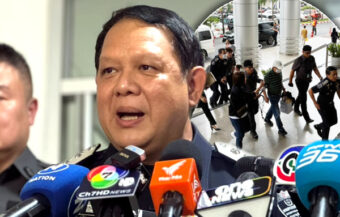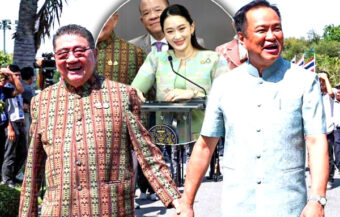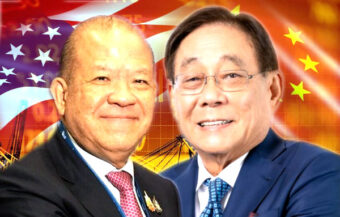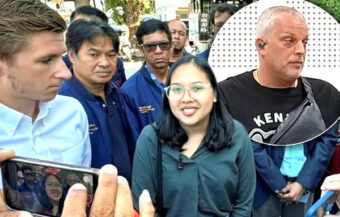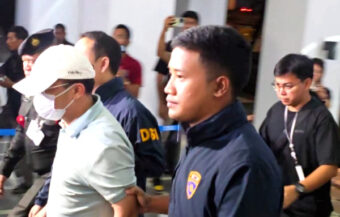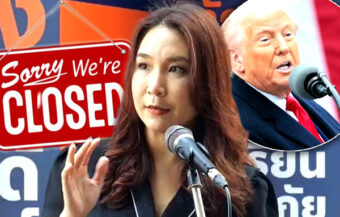Thaksin confirms US raised Paul Chambers’s case with Thailand as broader talks focus on trade, security and human rights amid growing US concern over Chinese factories. House Committee raises misuse of lèse-majesté law and damage to Thailand’s international reputation.
Former Thai Prime Minister Thaksin Shinawatra on Saturday confirmed that the case of Paul Chambers is being raised by US negotiators with Thailand. This is coming ahead of any substantive discussion. The former PM also revealed that the United States is examining not just tariffs on goods but the broader trade and business relationship with China in its assessment of Thailand in these talks. This comes after a blistering Military Committee session at the House of Representatives where Chairman Wiroj Lakkhanaadisorn castigated the Third Army for filing a lèse-majesté complaint against Mr. Chambers when the highly respected academic had no involvement whatsoever with the offending material. In turn, the original was based on a Facebook post criticising Naresuan University for employing the American.
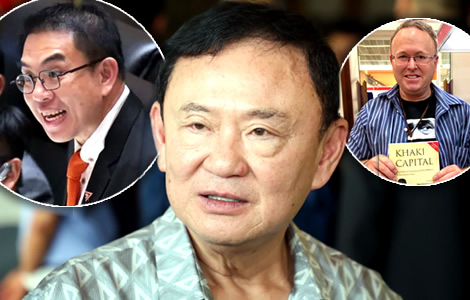
Former Prime Minister Thaksin Shinawatra has again spoken about Thailand’s challenge in dealing with US trade tariffs. Following his speech on Thursday night to American Chamber of Commerce members and US representatives, this time the former premier was in Chiang Mai.
At 12:10 p.m. on April 26, Mr. Thaksin lunched with friends at the Nakhon Pathom Ocha Beef Noodle Shop in the northern city while continuing his campaign efforts.
Thaksin campaigns in Chiang Mai and stresses caution and research in handling delicate US tariff talks
Thaksin is campaigning in his home city for the local mayoral race. At length, he is supporting Pheu Thai candidate Atsanee Buranupakorn. He was speaking at a noodle shop where he lunched with local friends and associates. During his remarks, Thaksin emphasised that negotiations on tariffs must be patient, cautious and well-researched rather than rushed.
Significantly, Mr. Thaksin revealed that the United States has indicated a wider concern than just tariff taxes and export controls. For instance, there are questions about wider Chinese influence in Thailand, particularly the embedded nature of Chinese firms in the economy.
He also hinted that some concerns involve the security realm, not just economics, and thus require a nuanced approach.
This week, some analysts have suggested that Washington DC is concerned not only about export shipments but also about Chinese factories or facilities in Thailand. The Americans see these as nothing more than assembly centres, basically putting together already-manufactured items which are subsequently exported to America.
Concerns over Chinese presence grow as Thailand and United States move towards broader trade discussions
Certainly, there have been strong concerns expressed in Thailand previously about Chinese EV factories in Thailand, particularly that they do not outsource the supply of parts or components.
For instance, on Friday, Mr. Phuphot Sukphisarn, chairman of the Auto Parts Industry Club of the Federation of Thai Industries (FTI), revealed that Chinese firms only produced 16,000 EVs in Thailand last year.
Meanwhile, the kingdom saw 66,732 units sold in 2024. Notably, this was down by 13%. However, most of these were supplied by 26 Chinese EV manufacturers, some who are now based in Thailand. At the same time, these companies were paid a subsidy of between ฿50,000 to ฿100,000 per vehicle sold.
In its talks with the United States, Thailand is offering to buy more US energy and agricultural products. In addition, it is offering a selective reduction of Thai tariffs. Furthermore, there are hopes for a two-way deal on investments between Thai and United States companies. Thaksin revealed that extensive pre-talks preparation had rehearsed both Thailand’s vulnerabilities and America’s key strategic concerns about Asia.
Tighter export controls and reassessment of Thai industrial policies may emerge from new US trade talks
Finally, there are a raft of measures primarily understood to be aimed at tightening export fraud. According to the Minister of Finance Pichai Chunhavajira and Minister of Commerce Pichai Naripthaphan, this will mean stricter controls over certificates of origin. Furthermore, all foreign-owned factors including Chinese will be tested to ensure compliance. This will certainly mean adhering to quality standards.
At this time, the United States is interested in ensuring that goods labelled as Made in Thailand are both properly manufactured in the kingdom. This would be in contrast to an elaborate assembly scheme.
In turn, Thailand may have to recalibrate its industrial policies in addition to upgrading its quality assurance testing.
When questioned about delays in negotiations, Thaksin explained that the US was overwhelmed, balancing multiple Asian relationships simultaneously. He stressed that non-tariff matters like security and political considerations are now being mixed into trade talks.
Thaksin confirms US raised Paul Chambers’s case amid sensitive issues during expanded trade negotiations
In the meantime, Mr. Thaksin confirmed on Saturday that the United States trade representative had raised the case of Paul Chambers. The academic, who was a professor at Naresuan University in Phitsanulok, was arrested on April 8.
He was subsequently charged with lèse-majesté under Article 112 of the Criminal Code. In addition, he was charged with an offence under the 2007 Computer Crime Act.
Undoubtedly, this will create a particularly difficult problem for the Thai government. Such cases are understandably sensitive in Thailand. At this time, it is also before the courts.
Nonetheless, human rights, in particular related to free speech, is a cornerstone issue for the US Trump administration. Therefore, the issue will carry political weight in Washington DC. Thaksin also noted that sensitive legal issues like the Chambers case required blending inputs from many Thai government agencies.
On Friday, the case was examined by the House of Representatives Committee on military affairs. It had before it representatives from Internal Security Operations Command (ISOC) 3 and the Dean of the Faculty of Social Sciences at Naresuan University. Notably, the latter is Associate Professor Napisa Waiturakiat, Mr. Chambers’ wife.
Wiroj criticises the Third Army and police as initial complaint against Chambers based on spurious claims
Following the hearing, the Chairman of the People’s Party, Wiroj Lakkhanaadisorn, had a withering commentary on the Third Army headquartered in Phitsanulok, which filed the charges.
This is also synonymous with Internal Security Operations Command (ISOC) 3.
In addition, Mr. Wiroj cited the Phitsanulok Provincial Police and the Phitsanulok Immigration Bureau as bearing responsibility for what has happened.
In short, the party list MP and Military Committee Chairman said the complaint was initially based on a Facebook post. That post was made by Mr. “Eddie Atsadang”. The post called out Naresuan University for employing foreigners who attacked Thailand’s revered monarchy.
It later emerged that the Facebook post misinterpreted a public relations blurb for an academic seminar in Singapore.
In turn, it was further learned that the genesis of the complaint was this introduction in advance of a seminar. The events took place in Singapore in October 2024. It was organized by ISEAS – Yusof Ishak Institute. Certainly, Mr. Chambers had no part in what was written. Notably, this was later translated and reinterpreted in the provocative Facebook post. In turn, this was the basis for prosecuting Mr Chambers.
Mr. Wiroj on Friday slammed the lack of investigation into the matter. He suggested this should have taken place before Mr. Chambers was prosecuted. He underlined that ISOC and police failed to check if the translation was even correct before proceeding with charges.
Paul Chambers later granted bail and subjected to restrictions as concerns about his prosecution emerge
He warned that otherwise Thailand’s justice system could descend into crisis and anarchy.
On April 8th, Mr. Chambers, a highly respected US academic and media expert on Thailand and Southeast Asia, was arrested. He was later refused bail and spent a night at Phitsanulok Central Prison before eventually being granted bail of ฿300,000.
In addition, he was required to wear an ankle bracelet and was banned from leaving the country. Indeed, his passport was seized. After that, his visa allowing him to work and live in Thailand was revoked. This is a very serious matter for a man who has lived in the kingdom for 30 years.
ISOC’s alleged misuse of authority raised broader concerns about its understanding of its legal limits under security laws.
On Friday, the Military Committee Chairman announced that he was writing to the National Police Commissioner. Firstly, he wanted to know why this case was not properly investigated. Secondly, he wanted to know if any steps would be taken to ensure that such charges are not brought without a sound basis in law or properly adduced evidence.
Chambers case may trigger Anti-Corruption Commission probe of officials for mishandling the US academic’s case
Furthermore, Mr. Wiroj insisted that the matter must be forwarded to the National Anti-Corruption Commission (NACC). He said that damage has been done to the country’s international relations. In turn, the image and prestige of the monarchy may also be impacted.
Therefore, he was calling on the Royal Thai Police chief to institute proper investigatory protocols.
Meanwhile, he was filing a detailed complaint with the Anti-Corruption Commission.
In particular, it will be filed against Internal Security Operations Command (ISOC) Region 3. In addition, Phitsanulok Police Station and the Phitsanulok Immigration Bureau.
Mr. Wiroj said he would accuse them of violations under Sections 172 and 175 of the National Anti-Corruption Commission (NACC) Organic Act. This would be for misconduct by state officials. In addition, they were liable to investigation under Section 134, paragraph 2 of the Criminal Procedure Code. This was particularly for failing to examine the credibility of evidence before them before initiating a prosecution.
At the same time, Mr. Wiroj also asserts that there may be grounds for complaint under Section 200, paragraph 2 of the Criminal Code. This offence, in particular, relates to when an official coerces another person in pursuit of a conviction on a criminal charge.
Significantly, this case also draws attention in particular to another key issue. That is the difference in interpretation of English and Thai. This can present challenges when it comes to the legal prosecution of foreigners in Thailand.
Military Committee demands full NACC probe into misuse of Article 112 and lack of proper legal process
The Military Committee concluded that even if courts ultimately reject the case, those involved must still face an NACC investigation without delay. It was stressed that misuse of Article 112 damages both the monarchy and Thailand’s international reputation severely.
The committee will soon urge the Prime Minister to reinforce ISOC’s compliance with the law and curb any future overreach.
Paul Chamber’s brother says academic must be returned to United States before US-Thai trade talks
Thaksin announces a change in trade and industrial policy. Sounded much like a pivot towards the United States
In particular, Mr. Wiroj noted that it appeared no cabinet approval or resolution was made to undertake such a prosecution. Significantly, he said that was required under the Internal Security Act of 2008.
Recommendations will also include asking the National Police Chief to standardise the handling of sensitive lèse-majesté cases. Finally, the House Committee Chairman warned that Section 112 must not become a reckless tool for political or personal attacks.
Join the Thai News forum, follow Thai Examiner on Facebook here
Receive all our stories as they come out on Telegram here
Follow Thai Examiner here
Further reading:
Thaksin does not rule out joining talks in US as Thai team finalises plans. They fly out on Thursday
Trump’s remaking of World trade, if it works, will force Thailand to decide between the US and China

